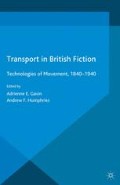Abstract
Two years before the serial publication of William Thackeray’s Barry Lyndon in Fraser’s Magazine (January to December 1844), Victorian commentator the Reverend Sydney Smith exulted that with recent improvements in England’s skeletal and disjointed railways, ‘Time, distance and delay are abolished’.1 By the time Barry Lyndon appeared such delight was tempered with fear, for 1844 marked both the onset of the mid-nineteenth-century Railway Mania (1844–7) and the passage of William Gladstone’s Regulation Act that mandated low-cost access to the railways. By democratizing travel, the Regulation Act paradoxically affected a form of social deregulation that contributed to the fears of a nation in flux. The discussion that follows asserts that the coincidence of Thackeray’s publication and Gladstone’s legislation makes Barry Lyndon an unwitting symbol of the worst social problems increased travel and the death of distance could generate for the middle and upper classes: class transgression, and the social and legal crimes that anonymity fosters. Thackeray himself mused over to ‘what new laws, new manners, new politics, vast new expanses of liberties unknown as yet, or only surmised?’ trains would lead.2 This necessarily troubles Thackeray scholarship, which has historically defined Barry’s near-epic transience as a function of the picaresque tradition.
Access this chapter
Tax calculation will be finalised at checkout
Purchases are for personal use only
Preview
Unable to display preview. Download preview PDF.
Notes
Sydney Smith, The Wit and Wisdom of the Rev. Sydney Smith, ed. Evert A. Duyckinck (New York: Redfield, 1856), 349.
William M. Thackeray, Roundabout Papers (London: Smith, Elder & Co., 1872), 72.
William M. Thackeray, Barry Lyndon, 1844, ed. Andrew Sanders (New York: Oxford University Press, 1984), 43.
John Francis, A History of the British Railway: Its Social Relations and Revelations, 1820–1845, vol. 2 (London: Longman, Brown, Green and Longmans, 1851), 151.
Martin Pugh, Britain Since 1789: A Concise History (London: St. Martin’s, 1999), 32–3.
Jack Simmons and Gordon Biddle, eds, The Oxford Companion to British Railway History (Oxford: Oxford, University Press, 1999), 311.
Anonymous, ‘On Railways’, Fraser’s Magazine 29.173 (May 1844): 501–17, 507.
Jack Simmons, The Victorian Railway (London: Thames and Hudson, 2009), 320.
Samuel Smiles, The Autobiography of Samuel Smiles, 1905, ed. Thomas Mackay (New York: Dutton, 1905), 79.
Andrew Sanders, ‘Introduction and Notes’, Barry Lyndon, by William Thackeray (Oxford: Oxford University Press, 1999), vii–xxvi, 321, n. 50.
Michel de Certeau, The Practice of Everyday Life (Berkeley: University California Press, 1984), 111.
John Ruskin, ‘The Extension of Railways in the Lake District’, in On the Old Road: A Collection of Miscellaneous Essays and Articles on Art and Literature (London: George Allen, 1899), 316.
Elizabeth Bleicher, Whom do you take me for? Imposture and Narrative Self-Fashioning in the Victorian Novel, Diss., University of Southern California, 2004 (Ann Arbor: UMI, 2004).
Editor information
Editors and Affiliations
Copyright information
© 2015 Elizabeth Bleicher
About this chapter
Cite this chapter
Bleicher, E. (2015). Distance is Abolished. In: Gavin, A.E., Humphries, A.F. (eds) Transport in British Fiction. Palgrave Studies in Nineteenth-Century Writing and Culture. Palgrave Macmillan, London. https://doi.org/10.1057/9781137499042_2
Download citation
DOI: https://doi.org/10.1057/9781137499042_2
Publisher Name: Palgrave Macmillan, London
Print ISBN: 978-1-349-69838-7
Online ISBN: 978-1-137-49904-2
eBook Packages: Palgrave Literature CollectionLiterature, Cultural and Media Studies (R0)

